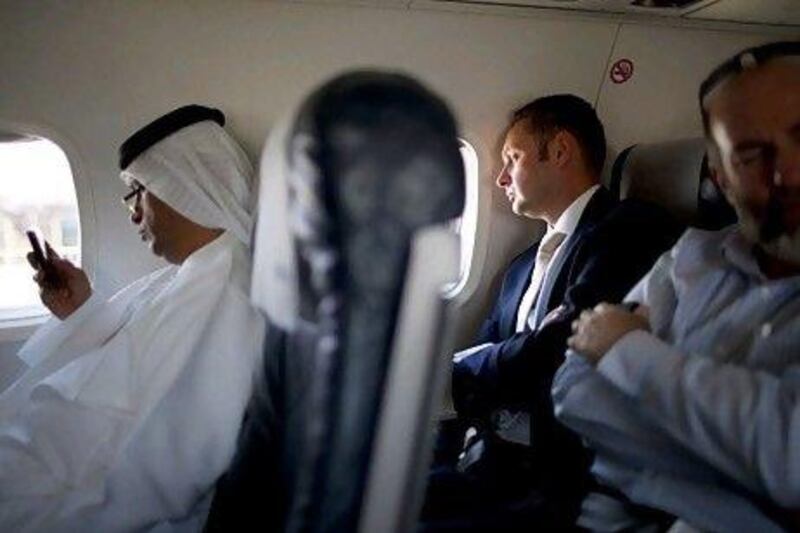The profits of global airlines are set for an unexpected recovery of more than US$1 billion (Dh3.67bn) by the end of the year as the industry defies the global gloom to increase sales and earnings - even in the most adverse of cisrcumstances.
The International Air Transport Association (Iata) upgraded this year's anticipated global airlines earnings to $4.1bn from its June forecast of $3bn. Carriers in the Middle East helped the rise more than most, with profits expected to more than double.
The increase was a welcome sign of a return to health from the gloomy first half of the year but was still a far cry from last year's $8.4bn in profits. Forecast profits would rise further next year to $7.5bn, Iata said.
Middle East carriers are anticipated to make a profit of $700 million this year, up from the $300m previously predicted by Iata, which represents about 80 per cent of global carriers.
"The outlook improvement is due to airlines performing better in a difficult environment," said Tony Tyler, Iata's director general and chief executive.
"The European sovereign debt crisis lingers on, China continues to moderate its growth and the impact of recent quantitative easing in Japan and the US will take time to yield growth," said Mr Tyler.
"While some of these risks have diminished slightly over recent months, they continue to take their toll on business confidence."
Despite weak business confidence in western economies, Iata raised its forecast for global passenger traffic demand by 0.5 percentage points to 5.3 per cent for the year. As the global downturn has battered the aviation industry, Middle East carriers have generally managed to outperform their peers elsewhere. Iata's data suggested this trend was continuing.
During the first eight months of the year, the region's passenger traffic rose at the fastest pace globally. A rise in demand of 17.1 per cent outstripped a capacity increase of 13.2 per cent.
It was a similar story in the cargo sector. Globally, cargo was anticipated to finish the year with a 0.4 per cent dip, Iata said. Yet in the region over the first eight months of the year, the cargo capacity growth of 13 per cent was below demand of 14 per cent.
Middle East carriers continued to capture a bigger slice of long-haul market share by raising connections through their burgeoning hubs, Iata said. The share of international passenger traffic held by its carriers reached 11.5 per cent by August from 4.8 per cent in 2002, it said.
In an example of the growing inroads the region's airlines are making on the global aviation market, Etihad Airways yesterday announced a codeshare deal with Saudi Arabia-based nasair on 26 flight sectors across the Middle East, North Africa and Asia.
It brings to 39 the number of airlines with which Etihad has codeshare agreements as it seeks to position Abu Dhabi as a transfer point for greater flows of passengers travelling within the region and between Asia and Europe.
"The agreement will provide air travellers in Saudi Arabia with seamless flight connections and access on more than 20 short and long-haul Etihad Airways flights," said James Hogan, the Etihad president and chief executive. "It also enables Etihad Airways to boost our connections to Jeddah and, for the first time, Medinah."
Despite a healthier outlook in the Middle East, North America, Asia, Africa and Latin America, Iata warned the aviation industry was still facing challenges from high oil prices.
Fuel prices were the largest cost for RAK Airways, representing about 30 to 32 per cent of total outlay, said the airline's chief executive, John Brayford.
"The worry for fuel is not the high level of prices but that it varies so much over a short period of time. We are working with suppliers to ensure such benefits are passed on [as quickly as price increases are passed on]," he said on the sidelines of the World Route Development Forum in Abu Dhabi yesterday.
"Our staff compete against each other to fly as efficiently as possible each day."
Iata said it expected oil prices to average $110 per barrel for the year. It raised its forecast for jet fuel prices by $1.20 per barrel from June to $127.70, bringing an anticipated $208bn cost for the year.
To mitigate the impact of higher fuel costs, My Tyler said the industry had invested in new fleets and more fuel efficiency initiatives.
"But despite these efforts, the industry's profitability still balances on a knife-edge," he said.
[ lgutcher@thenational.ae ]





